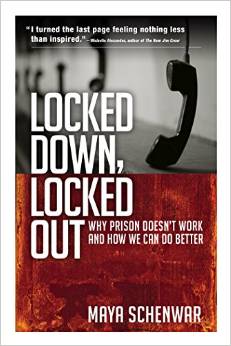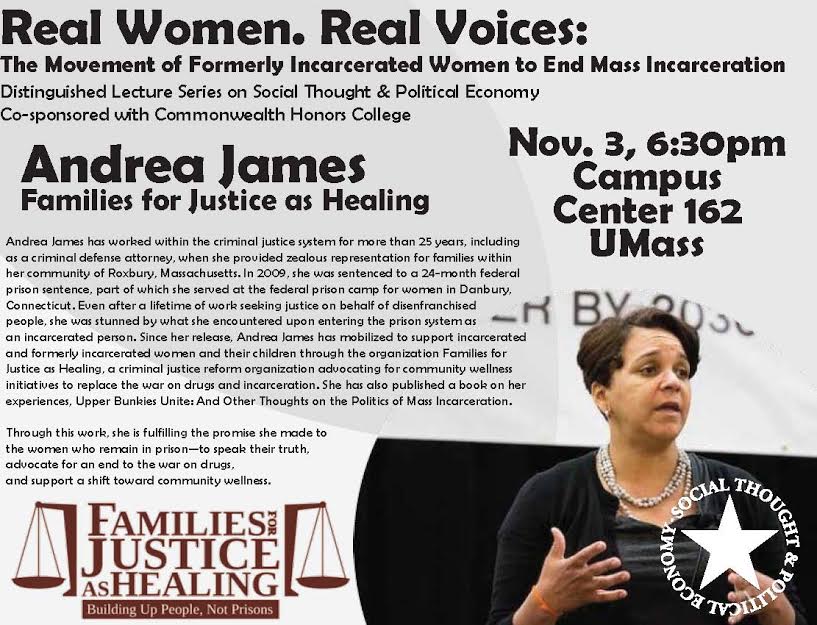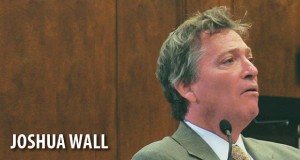
I started reading Maya Schenwar’s book which is aptly subtitled “Why Prison Doesn’t Work and How we can do Better,” just as I was dealing with a loved one who was suffering from drug addiction behind bars. I knew all too well the feelings of “Just keep her in jail for God’s sake, maybe she’ll be safe and stop using.”
Schenwar begins this book with her sister’s addiction, and it is a good hook, a real way to draw us in, because the pain and frustration is so palpable. She, like myself, a prison activist, knows all too well that prison or jail is hardly a place to detox — a hard cold floor, sometimes naked, sometimes screaming — hardly a place for the kind of safety we’d like for those we love.
But Schenwar’s sister’s struggle and her family’s excruciatingly painful experience of dealing with it is only her entry point into the story of incarceration. This saga, as she says, is borne by all who love someone locked up, although “this country’s most marginalized communities bear the overwhelming brunt of the devastation.” Locked Down, Locked Out is a heartfelt book which takes to task the “behemoth” often called “the prison industrial complex.” Prisons and jails are locking up 2.3 million people behind bars and Schenwar gives us stories as well as facts to illustrate its inner workings, while still managing to present us with hopeful alternatives to prisons.
Schenwar, who runs the website Truthout, is an accomplished journalist who has interviewed and connected with prisoners across the country. She gives us insight after insight as she takes us through snapshots of incarceration issues. As she says in her chapter entitled, “The Visiting Room,” connection to outside loved ones is necessary for prisoners. I paused, hurt welling up in my throat when I read “Even for the most dutiful visitors and appreciative visitees, prison feels like abandonment.” Not only does that ring true for my family member behind bars but for all the women I taught for ten years. How often they lingered at the steel door when I left my class for the evening with words like “Have a safe ride home.” I remember how I walked down a long hall, women fading into the distance as I exited the prison.There is no way for anyone involved in the criminal justice system to read this book without having such images float into your mind.
Schenwar also gives us words of prisoners who say how much mail means to them, images that evoke hope even in the form of the simplest post card. She talks of how families are bereft after their loved ones get sent away, along side the idea that many think by incarcerating lawbreakers, we are getting rid of the “bad eggs.” And she poignantly asks: “What exactly are we wishing for when we want someone close to us incarcerated?” This is a wonderful question, and one I hadn’t exactly thought of so was glad to hear her answers which are personal and human— for them to stop hurting, among them. But she knows too well that prison may not stop prisoners’ “spiraling” record or return them to fulfilling, happy lives. And in spite of the fact that one young man whom she interviews tells her, at least “You’re not gonna get shot here,” her search for answers for her sister and for others causes her to explore how can we keep people out of prison.
So what are Schenwar’s answers? While the book is a bit disjointed here, as she goes through her sister’s release, pregnancy, and a variety of programs, she does use her personal experience to enhance our understanding of her discoveries. One of the best, is how she points out the positive that comes from building communities for people who come out of prison or for people before they ever go in. She says “really effective treatment means bringing people out of isolation—not imposing more of it.” She points out ways people on the inside work with people on the outside through telling their stories. And she highlights some particular community-based programs that she has encountered from shore to shore, including her sister’s recovery house for previously-incarcerated mothers where her sister can stay with her baby.
It’s a hopeful way to end the book although, for those of us who live with someone always on the brink of a relapse, we know that addiction is not a problem easily solved. Schenwar promises no happy ending here. Heroin users get clean or they often die. This I know from my loved one’s addiction. But, while Schenwar shows how prison is not the answer to addiction, her dedication to a better world is inspiring, and convincing too: there are solutions to what often feels like despair.



